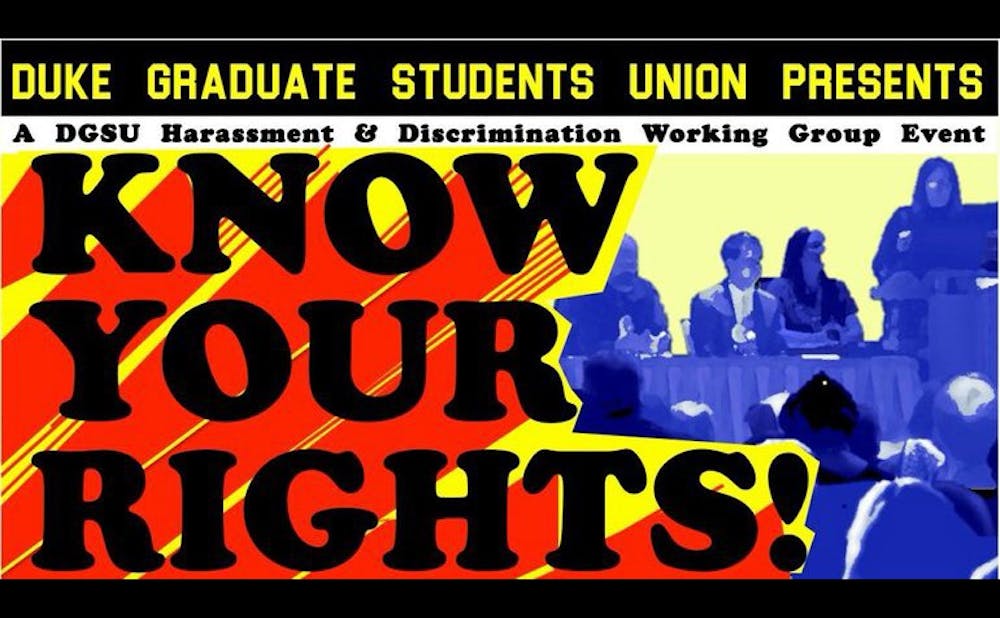For graduate students, the power dynamics of sexual harassment can be extremely challenging, and the Duke Graduate Student Union wants to make sure they know the resources and rights available to them.
On Friday, the organization’s Working Group on Harassment and Discrimination hosted a two-hour long workshop entitled “Know Your Rights!” in which five outside experts answered questions followed by training for attendees who wanted to become union representatives on the issue.
“Knowing our rights is a resource that has never been available to grad students at Duke,” said Jessica Gokhberg, general workers council representative for the Working Group and a Ph.D. candidate at Duke.
The workshop was only open to graduate students in order to create a safe space, and Gokhberg estimated the attendance at 40-50 people.
“At its most basic level, there is no grad student-specific policy that addresses harassment and discrimination, and so we’ve been kind of feeling isolated in that we have needs that have just not been addressed,” Gokhberg said. “So we decided to take it into our own hands.”
The panel of experts included a legal counsel from the Service Employees International Union, a lawyer and current Ph.D. candidate, a board member of Equality North Carolina and the Human Rights Campaign, a J.D. and Master’s student from UNC and a sexual assault awareness advocate with the Durham Crisis Response Center. A crisis intervention support person was also present.
Gokhberg noted that the diversity of the panel was an important component, as they had experts speaking on the intersection of harassment and race and of harassment and gender presentation.
“Even the composition of the people who decided to come, it really showed a demand for this resource in particular that is not provided by any kind of organization that exists on campus,” Gokhberg said. “Whether you want to be in the union or not, you need this resource and we are here to provide it for you.”
The Know Your Rights workshop is not a new idea. Gokhberg said it’s been used by other organizations that want to self-educate their members about the resources and rights they can access.
“It was a really wonderful panel, with information that we’ve never seen before that is not contained to Duke’s campus, or even to our policy,” Gokhberg said. “Transparent resources—which is something we’ve never gotten.”
Hannah Rogers, a fifth-year English graduate student and the union’s communications director, noted the union is outside of the University’s power structure. Although people working at Duke can explain the process to you, they work for the University and have a bias even if they don’t realize it, she said.
Ajenai Clemmons, a third-year public policy Ph.D. student, said that hearing that free legal representation is available to graduate students is a “pretty huge” resource that she said she had no idea about. She added that the panel did a good job of giving concrete actions students could take if ever a bystander or ever victimized, and how to change the culture.
Jarron Bowman, a fourth-year Ph.D. candidate in sociology, said that the free outside legal counsel was a very important resource because of the potential conflicts of interest for people who are also representatives of the University.
“A common theme of the discussion was power and power dynamics, and I think graduate students are inherently at a power differential relative to faculty and they are dependent on faculty for their professional development opportunities,” he said.
Bowman noted that given that dynamic and the close relationships that are formed between faculty and their graduate students, there is the opportunity for situations to become dangerous for graduate students.
He noted that on the flip side of that, graduate students interacting with undergraduates may not have a big age differential, but the power differential is significant.
“I think it’s important to be aware of that and for graduate students to understand how power works in both directions,” Bowman said.
Laura Bellows, a fourth-year public policy Ph.D. candidate and union member, noted that graduate students can face heavy repercussions professionally if they transparently report harassers. That may be one reason the #MeToo movement has yet to be seen quite as strongly in academia, she said.
“We know through whisper networks the way certain people act and interact. To some extent being transparent about that can have a lot of repercussions for you personally,” Bellows said. “So we haven’t necessarily seen that #MeToo movement within the academy.”
Get The Chronicle straight to your inbox
Signup for our weekly newsletter. Cancel at any time.
Bre is a senior political science major from South Carolina, and she is the current video editor, special projects editor and recruitment chair for The Chronicle. She is also an associate photography editor and an investigations editor. Previously, she was the editor-in-chief and local and national news department head.
Twitter: @brebradham
Email: breanna.bradham@duke.edu

